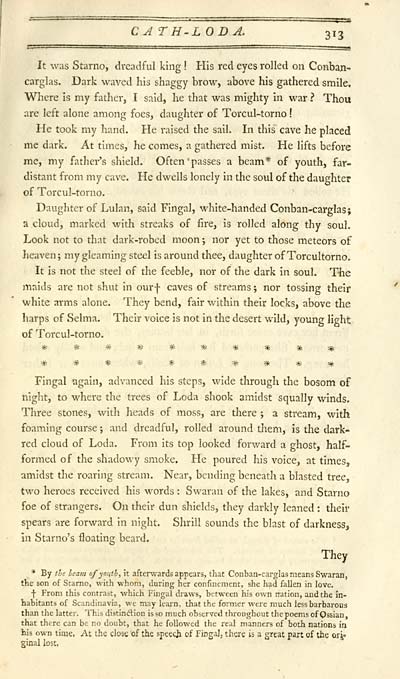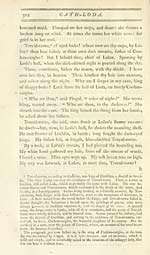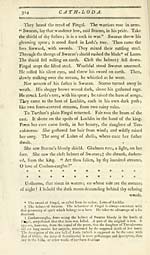Download files
Complete book:
Individual page:
Thumbnail gallery: Grid view | List view

CATH-LODA. 313
It was Starno, dreadful king ! His red eyes rolled on Conban-
carglas. Dark waved his shaggy brow, above his gathered smile.
Where is my father, I said, he that was mighty in war ? Thou
are left alone among foes, daughter of Torcul-torno !
He took my hand. He i-aised the sail. In this cave he placed
me dark. At times, he comes, a gathered mist. He lifts before
me, my father's shield. Often 'passes a beam* of youth, far-
distant from my cave. He dwells lonely in the soul of the daughter
of Torcul-torno.
Daughter of Lulan, said Fingal, white-handed Conban-carglas;
a cloud, marked with streaks of fire, is rolled along thy soul.
Look not to that dark-robed moon ; nor yet to those meteors of
heaven; my gleaming steel is around thee, daughter of Torcultorno.
It is not the steel of the feeble, nor of the dark in soul. T-he
maids are not shut in ourf caves of streams ; nor tossing their
white arms alone. They bend, fair within their locks, above the
harps of Selma. Their voice is not in the desert wild, young light
of Torcul-torno.
Fingal again, advanced his steps, wide through the bosom of
night, to where the trees of Loda shook amidst squally winds.
Three stones, with heads of moss, are there j a stream, with
foaming course ; and dreadful, rolled around them, is the dark-
red cloud of Loda. From its top looked forward a ghost, half-
formed of the shadowy smoke. He poured his voice, at times,
amidst the roaring stream. Near, bending beneath a blasted tree,
two heroes received his words : Swaran of the lakes, and Starno
foe of strangers. On their dun shields, they darkly leaned : their
spears are forward in night. Shrill sounds the blast of darkness,
in Starno's floating beard.
They
* By the beam of youth, it afterwards appears, that Conban-carglas means Swaran,
the son of Starno, with whom, during her confinement, she had fallen in love.
f From this contrast, which Fingal draws, between his own nation, and the in-
habitants of Scandinavia, we may learn, that the form.er were much less barbarous
than the latter. This distindion is so much observed throughout thepoems of Qssian,
that there can be no doubt, that he followed the real manners of both nations in
his own time. At the close of the speech of Fingal, there is a great part of the ori-
ginal lost.
It was Starno, dreadful king ! His red eyes rolled on Conban-
carglas. Dark waved his shaggy brow, above his gathered smile.
Where is my father, I said, he that was mighty in war ? Thou
are left alone among foes, daughter of Torcul-torno !
He took my hand. He i-aised the sail. In this cave he placed
me dark. At times, he comes, a gathered mist. He lifts before
me, my father's shield. Often 'passes a beam* of youth, far-
distant from my cave. He dwells lonely in the soul of the daughter
of Torcul-torno.
Daughter of Lulan, said Fingal, white-handed Conban-carglas;
a cloud, marked with streaks of fire, is rolled along thy soul.
Look not to that dark-robed moon ; nor yet to those meteors of
heaven; my gleaming steel is around thee, daughter of Torcultorno.
It is not the steel of the feeble, nor of the dark in soul. T-he
maids are not shut in ourf caves of streams ; nor tossing their
white arms alone. They bend, fair within their locks, above the
harps of Selma. Their voice is not in the desert wild, young light
of Torcul-torno.
Fingal again, advanced his steps, wide through the bosom of
night, to where the trees of Loda shook amidst squally winds.
Three stones, with heads of moss, are there j a stream, with
foaming course ; and dreadful, rolled around them, is the dark-
red cloud of Loda. From its top looked forward a ghost, half-
formed of the shadowy smoke. He poured his voice, at times,
amidst the roaring stream. Near, bending beneath a blasted tree,
two heroes received his words : Swaran of the lakes, and Starno
foe of strangers. On their dun shields, they darkly leaned : their
spears are forward in night. Shrill sounds the blast of darkness,
in Starno's floating beard.
They
* By the beam of youth, it afterwards appears, that Conban-carglas means Swaran,
the son of Starno, with whom, during her confinement, she had fallen in love.
f From this contrast, which Fingal draws, between his own nation, and the in-
habitants of Scandinavia, we may learn, that the form.er were much less barbarous
than the latter. This distindion is so much observed throughout thepoems of Qssian,
that there can be no doubt, that he followed the real manners of both nations in
his own time. At the close of the speech of Fingal, there is a great part of the ori-
ginal lost.
Set display mode to: Large image | Transcription
Images and transcriptions on this page, including medium image downloads, may be used under the Creative Commons Attribution 4.0 International Licence unless otherwise stated. ![]()
| Early Gaelic Book Collections > Ossian Collection > Poems of Ossian, the son of Fingal > (325) |
|---|
| Permanent URL | https://digital.nls.uk/77927126 |
|---|
| Description | Selected books from the Ossian Collection of 327 volumes, originally assembled by J. Norman Methven of Perth. Different editions and translations of James MacPherson's epic poem 'Ossian', some with a map of the 'Kingdom of Connor'. Also secondary material relating to Ossianic poetry and the Ossian controversy. |
|---|
| Description | Selected items from five 'Special and Named Printed Collections'. Includes books in Gaelic and other Celtic languages, works about the Gaels, their languages, literature, culture and history. |
|---|

